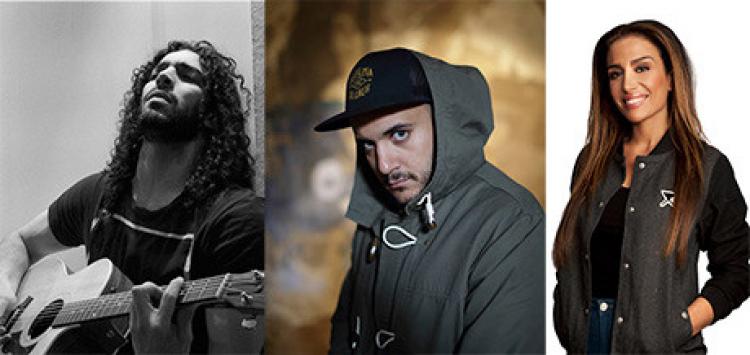Art as resistance

The conversation takes place Tuesday 24 November at 7pm, Stora Teatern in Gothenburg, Sweden.
Ramy Essam
Ramy Essam’s music led him to become one of the lead figures at the Tahrir Square in Cairo during the Egyptian Revolution of Spring 2011. Several of Essam’s songs are based on slogans chanted at the Tahrir Square as the revolution evolved, slogans which, accompanied by Essam’s music, reached an ever broader audience, making them a powerful way of attacking ex President Mubarak’s regime without resorting to violence.
The song “Irhal” (“Leave”) was written in a tent in the middle of Tahrir Square, and then performed before hundred thousands onlookers at the Square, before spreading worldwide through Youtube. It was later elected third most world changing song in history by Time Out.
Ramy Essam was charged and tortured by Egyptian military in 2011 before fleeing to Malmö city of refuge in 2014.
Khaled Harara
Khaled Harara is a renowned Palestinian hip-hop artist, who lived as a refugee in Gaza. His texts discuss the political situation in Palestine from a humanitarian and social perspective and criticize the lack of freedom of expression and the suffering in Palestine under the Hamas rule.
In Gaza, Harara was the first to organise hip-hop workshops for youth, focusing on writing texts and on different ways of expressing oneself. The workshops were banned, just like his group “Palestinian Unit” and the artist organisation that he was a member of.
As a result of his artistic expression, and his participation as a soldier of the PLO forces before Hamas took control of Gaza, Harara is considered an “enemy of the state”. More than once, he has been to prison and several of his friends have been killed or injured in fights against the Hamas. In fear of continuing reprisals, Khaled Harara stayed on in Denmark after participating in the festival “Rapolitics”.
During his stay in Gothenburg Khaled Harara has taken part in several public events, debates and workshops. He released two new singles in 2015 with the jazz rock band Makten & Härligheten. He currently studies music at the University of Gothenburg, and is running a project on facilitating and developing rap music in Gaza.
Upon arriving in Gothenburg in 2013, Harara stated that music is the most powerful language, much more powerful than weapons.
Ametist Azordegan
Essam and Harara will be interviewed by the music journalist Ametist Azordegan, who is currently writing a book about the history of Swedish hip hop music. A genre that often takes a political stand and brings world injustice to the surface. She is in the jury for the Grammis, and Swedish Music Hall of Fame, and writes about the connection between music and politics.
Latest news
-
23.04.24
-
18.04.24
-
04.04.24
-
26.03.24
-
21.03.24






